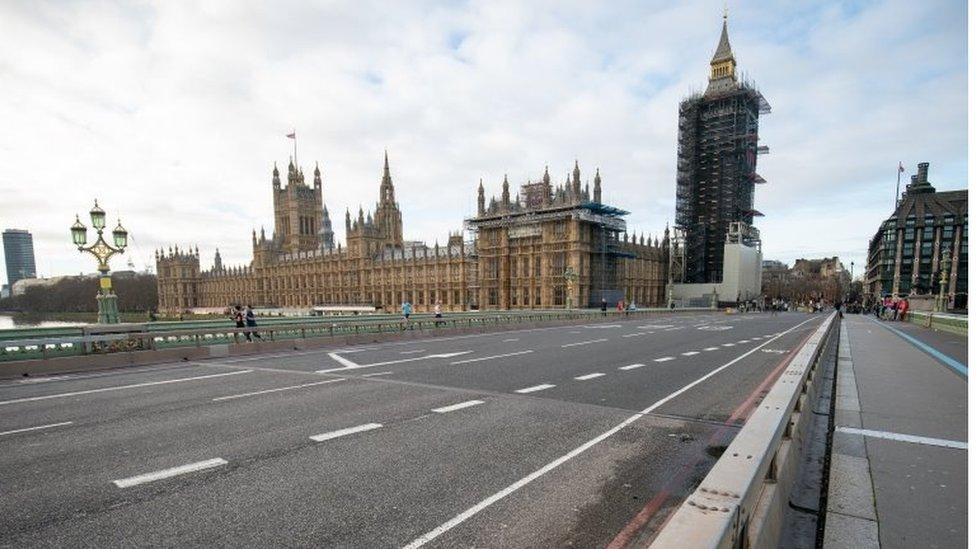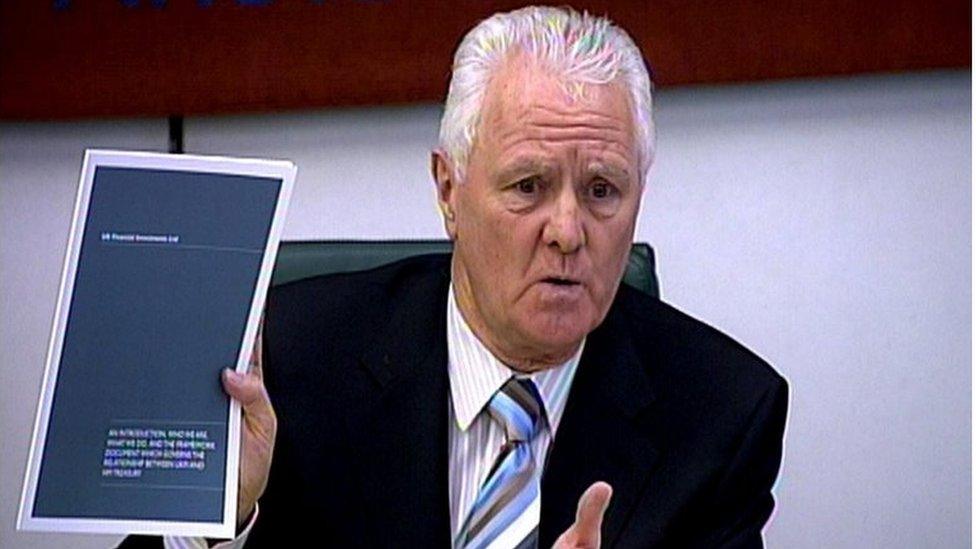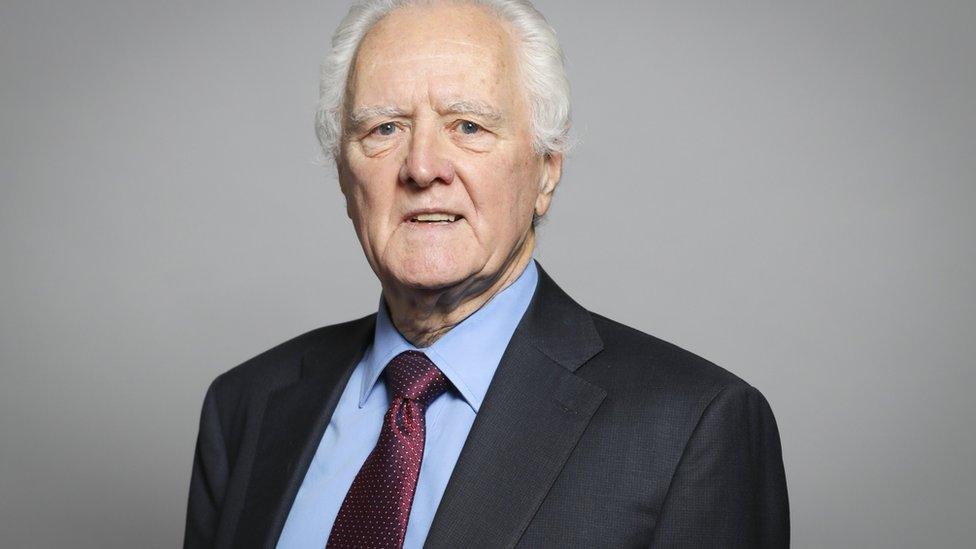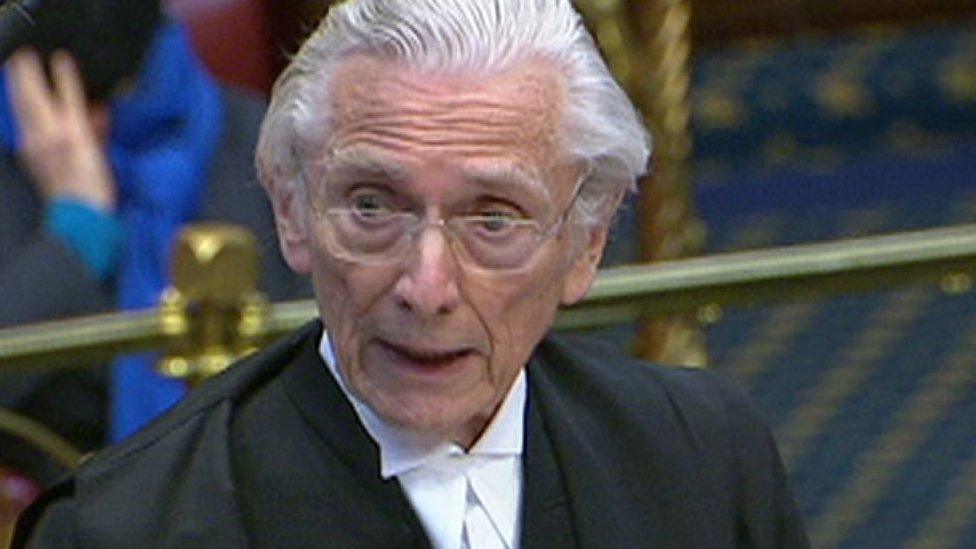Who is the new man in charge of the House of Lords?
- Published

It was an impossible election to read.
The voters are an enigmatic bunch and what campaigning took place was invisible to those outside the red-carpeted confines of the House of Lords.
But now the Upper House has voted in a new Lord Speaker to replace the retiring Lord Fowler.
Lord John McFall, the former Labour MP and current Senior Deputy Speaker will take his place on the woolsack and preside over the House from 11 May.
His rivals were Labour's Lady Hayter (some were worried she was too young) and the Lib Dem Lord Alderdice (many in the main parties could never bring themselves to vote for a Lib Dem), so there's a hint that for many Lord McFall was the safe option.
His main challenge will be to find a way to edge the House back towards its normal pre-Covid working methods - although quite a number of the more established peers have discovered that they rather like being able to participate and vote online from the comfort of their own home.
Another possible challenge stems from the mutterings that the government might attempt to clip the wings of the Upper House, where ministers have now lost well over a hundred votes in the current parliamentary year.
Peers are certainly very sensitive about their legitimacy and criticisms of their House - but there's also a feeling that the government is just too busy to venture into a quagmire of constitutional reform.
A former maths and chemistry teacher, John McFall served briefly as a government whip and a junior minister - and then he became chair of the Commons Treasury Committee in 2001.
This was before the era when chairs were elected, so he was appointed through the "usual channels" of parliamentary deal-making.
He ignored warnings that he would be dealing with incomprehensible economics-babble and when the 2008 financial crisis struck, he presided over the famous 2008 session in which the "masters of the universe" the key figures in the financial crisis, apologised for their failings.

Lord McFall held the post of Treasury Committee chair at a time when the activities of banks were making front page news
Some of his grillings of key City figures made national headlines. He once asked the bosses of the high street banks why they thought their institutions were so hated.
Quizzing Sir John Gieve, deputy governor of the Bank of England, over the Northern Rock debacle, he accused him of being "asleep in the back shop while there was a mugging out front".
He said Northern Rock's chief executive was "asleep at the wheel" while the head of the Financial Services Authority was "not just sleeping, but comatose".
He even lured the head of Barclays bank into admitting that he had advised his own children to steer clear of Barclaycard.
In the Lords, he has served as Senior Deputy Speaker and chaired its Procedure Committee, where he clashed with some traditionalist peers over the continuing pandemic suspension of the controversial by-elections which are supposed to maintain the 92-strong contingent of hereditary peers in the Upper House.
That was the result of a 1990s compromise which allowed the removal of most of the hereditary peers, but while some want them to resume, other peers say the spectacle of elections for hereditary law-makers, where the number of candidates sometimes exceeds the number of voters, has made a mockery of the Lords.
'Steady as she goes'
In the two online hustings for the Lord Speakership, Lord McFall was notably cautious about stretching the powers of the office.
Peers pride themselves in being self-regulating and are extremely wary of ending up with a Commons-style Speaker, bellowing "Order! Order!" at them.
Lord McFall was equally cautious about creating a disciplinary offence of bringing the House into disrepute, that could result in the expulsion of a peer....he didn't like the idea of peers being punished for activities which didn't impinge on their parliamentary duties.
"He's no fool, but he's not a radical," one peer told me, suggesting that the noble electorate wanted a "steady as she goes" candidate to replace Lord Fowler, who had gently pushed the boundaries of the Lord Speakership.
Lord Speakers don't have much genuine power - but the Upper House operates by consensus and they can exert influence at critical moments, particularly when scandal strikes.
Related topics
- Published21 April 2021

- Published25 February 2021

